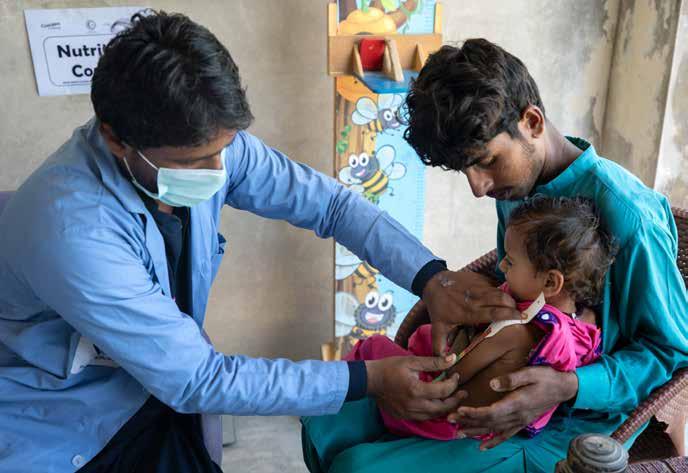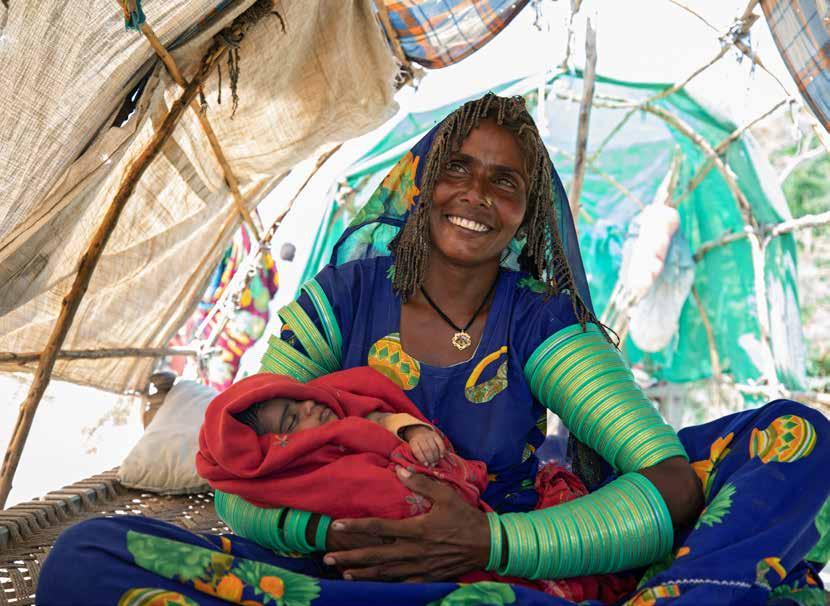
2 minute read
HOW WE HELPED: HEALTHCARE SERVICES JHAINI
Jhaini went into labour during the first night of the rains. Her husband took her to the hospital by motorbike but after the baby had arrived, they found themselves living on the side of the road, surrounded by floodwater.

Jhaini and one of her other children had a fever so they came to a mobile health clinic set up by a local partner of a DEC charity.
The clinic provided antenatal and postnatal care to mothers and babies as well as prioritising other vulnerable groups. Waterborne diseases as well as malaria and dengue fever increased due to the floods and a subsequent abundance of mosquitoes.
Many rural communities in Pakistan have extremely limited access to health services – particularly those living in remote areas and those who cannot afford to pay for treatment. Many health facilities were damaged by the floods, and stagnant floodwater, combined with damage to water infrastructure and sanitation, increased the risk of waterborne diseases such as cholera and dysentery and mosquito-borne diseases such as malaria and dengue fever.
DEC funds were used to set up mobile health units targeting displaced communities and people who were unable to access healthcare. The units were staffed and equipped to provide primary healthcare, maternal neonatal and reproductive healthcare, nutrition, and free medicines. Health activities were coordinated with provincial and District Health Departments (DHDs) to make referrals for further treatment if needed. Community leaders were consulted to ensure vulnerable people were aware of and could access the services. In most cases, DHDs provided medical staff including doctors, nurses and ‘Lady Health Visitors,’ who typically provide nursing, maternal and child healthcare and training in rural communities.
One DEC member charity wrote in a monitoring report that: “As the floods resulted in waterborne diseases, skin infections, damages to health facilities, and increasing challenges to access those that were functioning, the medical camps and the provision of primary healthcare services at accessible locations responded to a dire need of the affected populations and provided much needed relief and support at a crucial time.” They also conducted a survey of people using the services that found that 82% were satisfied with them.
The project identified and addressed factors influencing gender disparities and constraints in health and quality of healthcare, such as access to maternal and reproductive health services. Both female and male staff were involved to ensure that women and girls were able to use the services. More broadly, the training needs of health staff were assessed and appropriate technical training was organised for partners and DHDs to ensure quality services were provided.
In addition, awareness-raising sessions were held in communities on topics such as nutrition and good dietary habits, breastfeeding, use of clean and safe drinking water and its importance for overall wellbeing. These sessions were delivered in local languages and designed to be engaging and easy to understand in order to retain the key messages.










